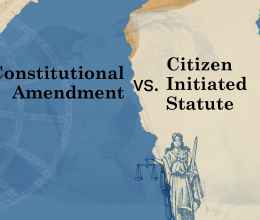Without ever being charged with a crime, you can have your property permanently seized and sold for profit to subsidize law enforcement agency budgets in Ohio. This practice, known as civil asset forfeiture, gives law enforcement agencies the ability to take any asset–such as cash, vehicles, real estate and other personal property–without a warrant, a conviction, or even criminal charges.
If law enforcement believes that property owned by someone was used in a crime, they have the right to seize it. Under current law, people have little recourse to reclaim their property if they are found to be innocent.
Bipartisan Coalition Works to End Unethical Practice
A new bipartisan bill, introduced by state Rep. Robert McColley (R), would put an end to this exploitive practice.
The bill unites both the political left and right in support of the 4th Amendment, which prohibits unreasonable search and seizure and protects the rights of citizens to due process of law. Further, by taking legal action on our property based on a suspicion of illegal activity, civil asset forfeiture violates the fundamental right to be recognized as innocent until proven guilty.
Currently, the process for civil asset forfeiture puts the burden of proof on citizens, who must use the courts to prove that their property was not used in a crime. The proposed bill would shift the burden of proof onto the state where it belongs.
For more information on why the ACLU of Ohio supports civil asset forfeiture reform, read our press release.
Vast Majority of Citizens Never Even Charged with a Crime
According to a study of over 500 federal cases, over 80% of citizens whose property had been taken under civil asset forfeiture were never even charged with a crime. This makes it clear that police are not targeting criminal activity. Instead, they are targeting vulnerable individuals as a way to make a profit off of innocent Americans. In any other context, this would be known as robbery.
Ohio Citizens Have Cash Seized Without Due Process
Cash makes up a large portion of seized assets. Two recent cases in Ohio provide examples of how citizens have had their cash seized, with no hope of seeing their hard earned money again. In one case, the young person lost their entire life savings. Another individual, a woman travelling across the country to purchase artwork, had her cash stolen by law enforcement.
Use of civil asset forfeiture incentivizes the theft of personal property by police for the purpose of padding agency budgets. Even more alarming, many of the items purchased by these stolen assets were not related to relevant law enforcement activities.
Civil Asset Forfeiture Targets The Most Vulnerable
Even if found innocent, it is unlikely that people are able to get their property back. In fact, 80% of civil forfeiture cases go uncontested, due to the high cost of a defense in court. It is financially impossible for many individuals to fight for the return of their personal property.
Because they are less able to defend themselves, the most vulnerable communities are targeted by law enforcement agencies looking to subsidize their budgets. Communities of color and low income people receive disproportionate levels of policing and also experience disproportionate levels of property seizure through civil asset forfeiture.
Civil asset forfeiture also has a detrimental impact on police-community relations. It places the burden of collecting supplementary funds on police officers by seizing assets from vulnerable citizens. Funding for law enforcement is the duty of the legislature and local governments and should not be raised by violating people’s rights.
Even if found innocent, it is unlikely that people are able to get their property back. In fact, 80% of civil forfeiture cases go uncontested, due to the high cost of a defense in court.
Calls for Reform
Civil asset forfeiture reform supports honest police work and helps strengthen relationships between the police and the communities they serve.
Recognizing the potential for abuse, many law enforcement agencies and state representatives support civil asset forfeiture reform. Critics of civil asset forfeiture cite the violation of rights guaranteed by the US Constitution, and object to practices that target vulnerable communities without due process.
Stand with the ACLU of Ohio and the bipartisan Fix Forfeiture coalition in passing civil asset forfeiture reforms in Ohio.








